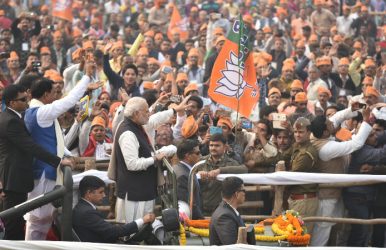By Catherine Putz
 India has long desired to be counted among the world’s top powers, an aspiration that is finally at hand. In her latest book – Our Time Has Come: How India is Making Its Place in the World – Alyssa Ayres, a senior fellow at the Council on Foreign Relations, explains that while on the path to becoming a recognized great power, India has not fully abandoned its past policy positions. In the following interview, Ayres discusses India’s progress toward becoming a “leading power” and what New Delhi brings to the global table.
India has long desired to be counted among the world’s top powers, an aspiration that is finally at hand. In her latest book – Our Time Has Come: How India is Making Its Place in the World – Alyssa Ayres, a senior fellow at the Council on Foreign Relations, explains that while on the path to becoming a recognized great power, India has not fully abandoned its past policy positions. In the following interview, Ayres discusses India’s progress toward becoming a “leading power” and what New Delhi brings to the global table.
The title of your new book – Our Time Has Come – certainly sets the tone: India has arrived on the great power scene. Can you describe, in brief, some of the changes that have taken place over the past 25 years to bring India to this point?
Let me expand on this, as the book is actually more nuanced on this issue. The title is a quote from the current and former prime ministers of India. I believe it captures a sensibility across parties: that Indian leaders want to see their country counted as one among the world’s powers in a multipolar world. This ambition in fact is not new, as I chart in the book. But India is now closer to attaining that ambition than at any time in the past. Part of this is due to changes in the world, a shift to more of a multipolar order. Part of this is due to India’s own economic growth, which has allowed the size of its economy to overtake those of Canada, Brazil, and Italy. It is entirely possible that the Indian economy could surpass those of France and the U.K. this year as well, making it the world’s fifth largest. That is automatically a different kind of heft. India has also, over the past decade and a half, placed increasingly greater priority on modernizing its defense forces, shoring up its capabilities as a maritime power, and declaring its ambition for primacy in the Indian Ocean, including embarking upon its first-ever overseas military bases. Add to all this India’s continued push for reform of the twentieth-century institutions of global governance to better accommodate its voice — and its willingness to help create new ones — I could go on, but you take all this together and it paints a very different picture of India today than the India of some years back.
No comments:
Post a Comment